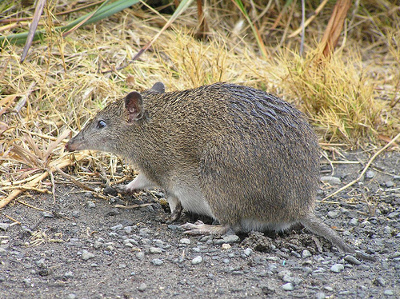Banicoot
Category: Marsupial

Facts about Bandicoot "Scientific name for Bandicoot is Isoodon obesulus". The Bandicoot is one among the group of 20 small to medium-sized breeds of animals. The Bandicoots are terrestrial marsupial omnivores that belong to the Peramelemorphia family. Bandicoots are largely found in Australia and commonly found in coastal areas of New South Wales.
Appearance of Bandicoot
Bandicoots are tiny, omnivorous marsupials that have a body size equal to a rabbit, and have a pointy nose, thin tail, humped back and big rear feet. The Bandicoots appear with a body length, ranging from (31 cm to 43 cm), and with a maximum body weight of (1.5 kg). The Bandicoot have a short tail, pointed ears, grey-brown colored fur and a white underbelly. The fur of the Bandicoots is thick and rough.
Features of Bandicoot
Bandicoots are one among the few varieties that have a diverged penis. Their embryos are different from other marsupials that form an organ similar to a placenta, which joins it the uterine wall. The purpose of this organ is most likely to transport nutrients from the mother. However, this organ is smaller in the structure when compared to the organs of the Placentalia.
Diet of Bandicoot
Bandicoots are mainly night-time omnivorous animals that feed on spiders, earthworms, insects and their larvae. The Bandicoot also feed on plant roots, tubers and fungi similar to a truffle to increase their diet.
Uses of Bandicoot
Bandicoot foraging plays a significant role in keeping the ecosystems of bush land healthy. They can be helpful in gardens owing to their craving for grubs and backyard pests. The Bandicoot are possibly best recognized for the nose-shaped holes they used to leave in inhabited lawns.
Health issues of Bandicoot
The organs also serve as a main reservoir for Coxiella Burnetii. Disease is spread among Bandicoots through ticks. These are then spread to household animals, such as sheep, cattle and poultry. The polluted domestic animals shed them in faeces, urine and placental products. It is passed on to human beings, resulting in Q fever by breathing the sprays of these materials. Major symptoms may be hepatitis pneumonia.
The average lifespan of Bandicoots is two to four years.

 Back To Category Marsupial
Back To Category Marsupial